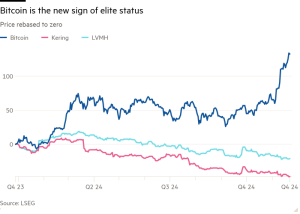The human race is suffering from success
Unlock the Editor’s Digest for free
Roula Khalaf, Editor of the FT, selects her favourite stories in this weekly newsletter.
The human race is suffering from success. Our own ingenuity, our capacity to keep inventing and innovating, means that almost all of us live not just geographically but more importantly technologically a million miles away from the “EEA”: the environment of evolutionary adaptedness.
One reason why modern, wealthy societies struggle with rising obesity, say, is that the human body is built for hunter-gathering. Place us in an environment of abundant, tasty food and comfy chairs and we put on weight. Obesity, along with atherosclerosis, osteoporosis, certain cancers, type two diabetes and other conditions are sometimes dubbed “diseases of modernity”.
Of course, being very far from the environment we evolved for is a fantastic deal for essentially all human beings. Being exceptionally morbid, I sat down and worked out when, in past centuries, I would have shuffled off the mortal coil, even before you factor in my chances of being involved in some kind of violent crime or drafted into a war. At any point before the discovery of penicillin in 1928 the answer is that at best “I would have died at seven”, and the bacterial infection in particular was relatively contained and not that painful at the time.
Chances are that you, too, would have died long before reading this sentence. (Though whether this is a blessing or a curse of modern medicine I leave to your judgment, but from where I sit, being a little heavier than I should be is an exceptionally good trade.)
But diseases of modernity are a particular problem for states. For the most part, the essay question that modern welfare states are designed to answer is “how can we tackle the causes of ill health without driving people into destitution due to the cost of illness”, and the answers are geared around an era in which you dispensed antibiotics, chopped off limbs and buried people after a stroke or heart attack. The greater cost of this challenge now is part of why health spending continues to climb across the rich world.
Still more tricky politically are modern conditions that by definition have a fuzzier diagnosis, such as depression and anxiety. An artery is either damaged or it isn’t. The human body either produces insulin or it doesn’t. There is growing evidence that depression also produces measurable changes in brain activity, but so too does grief — a condition that many of us would regard as a healthy, rather than unhealthy, part of our emotional lives. And while we can examine the bones of the long dead and medical records from centuries ago and make useful inferences about physical illness, we can’t be so sure about mental illness.
This means that while there are many fraught arguments about how medical interventions to combat physical diseases of modernity should be paid for and by whom, few people argue that osteoporosis isn’t real or that clogged or damaged arteries can be banished with force of will. Tussles over where the money should come from are fraught enough — those about whether it even needs to be spent are another order of magnitude.
There are certainly more formal mental health diagnoses in 2024 than there were in 1621, when the scholar Robert Burton, writing in The Anatomy of Melancholy, described melancholy as a disease “so grievous, so common”. But we can’t easily be sure that increased diagnoses measure anything beyond better record-keeping and better medical knowledge. There are also considerably more doctors.
Just as important, there are significantly fewer causes of what Burton described as melancholia of “disposition”. We are less likely to experience the loss of a child, or to suffer with unexplained pain. If, as I think is reasonable, we stick to Burton’s definition that what marks out depression is that it is a characteristic of your resting condition, the average 17th-century person spent an awful lot more time in grief or in pain, and therefore had a lot less time to realise or identify that they were also experiencing Burton’s grievous and common disease.
So just as with clogged arteries and type two diabetes, growing numbers of mental health diagnoses are, in the main, a good problem to have.
True, they are expensive for states, households, businesses or all three. And in trying to deal with them it’s tempting for politicians to try to avoid the kinds of complicated conversations you need to have about who pays and who bears responsibility for tackling physical diseases. But there is no good reason to believe that the mental diseases of modernity are any less real than physical ones: and just as with physical complaints, they are problems of success that our ancestors would have been happy to have to deal with.
#human #race #suffering #success







